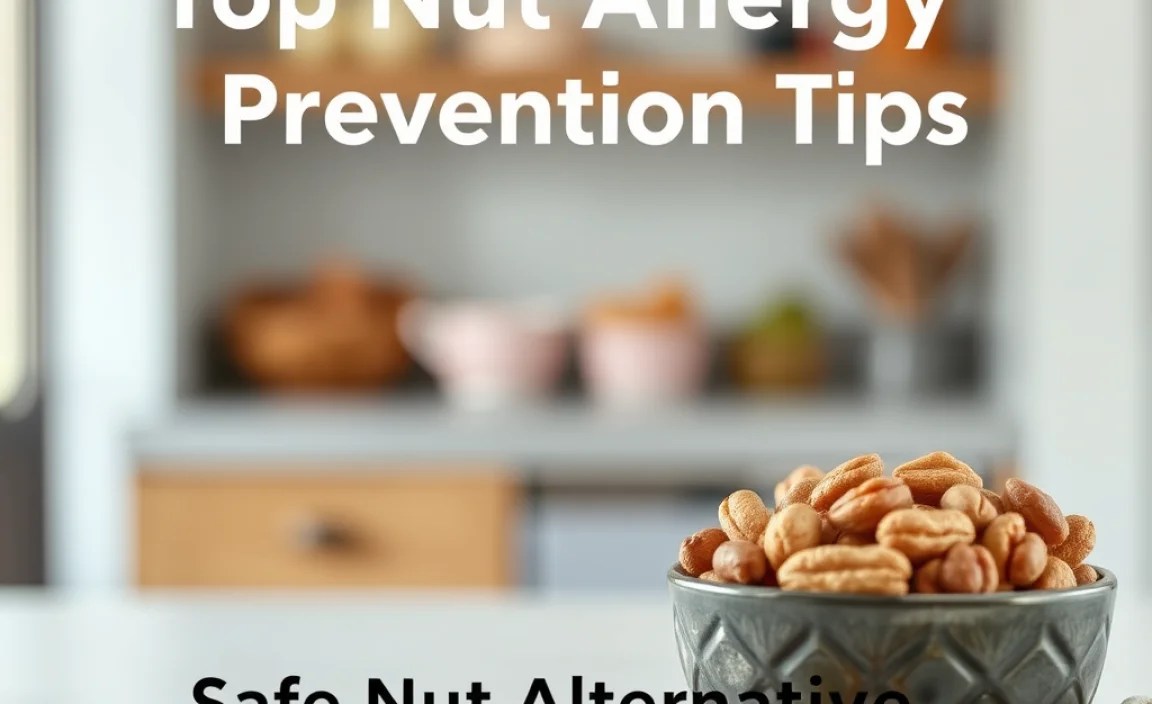Did you know that nut allergies can be serious? Some kids can’t eat nuts at all. But what if we could prevent nut allergies? What if we could help more kids enjoy peanut butter sandwiches? Let’s explore some nut allergy prevention tips to keep everyone safe and happy.
At A Glance
Key Takeaways
- Introduce nuts early to help prevent allergies.
- Understand how nut allergies can start.
- Watch for symptoms to act quickly.
- Use nut allergy prevention tips in daily life.
- Consult doctors for personalized advice.
Introducing Nuts Early On

Introducing nuts to children at an early age might help prevent nut allergies. Studies show that children who try peanuts before they turn one are less likely to become allergic. Parents can mix peanut butter with other foods for toddlers. But always be cautious and watch for signs of allergies. Small steps can make a big difference in preventing lifelong allergies.
- Start with small amounts.
- Mix nuts with familiar foods.
- Watch for any rash or swelling.
- Keep a record of foods tried.
- Ask a doctor before starting.
When introducing nuts, remember to do it safely. Stay calm and observe your child closely. Make sure they are in a safe place. Having some water nearby is a good idea too. Parents need to learn to spot allergy signs early. Prevention is always better than cure.
Fun Fact: Peanut allergies are one of the most common food allergies in children.
Why Start Early?
Why should we introduce nuts early? Scientists say it may help the body accept them. When babies try different foods, their bodies learn to recognize them. This can reduce the risk of allergies later. Imagine enjoying a peanut butter sandwich without worries. Starting early can make this possible. But remember, always be cautious and consult a doctor if needed.
Steps for Introducing Nuts
How can parents safely introduce nuts? First, check with your doctor. Make sure your baby is ready for solid foods. Next, choose a time when you can watch your child closely. Offer a small amount of nut butter mixed with another food. Keep an eye out for any allergic reactions. If all goes well, you can slowly increase the amount.
Signs of Allergic Reactions
What should you watch for when introducing nuts? Look for signs of an allergic reaction. A rash or hives can appear on the skin. The child’s face or lips may swell. Trouble breathing is also a critical sign. If you see these, stop feeding nuts and call a doctor. Knowing these signs can help you react fast and keep your child safe.
Understanding Nut Allergies

Nut allergies happen when the immune system overreacts. It thinks nuts are harmful, like a virus. This causes the body to fight back, leading to an allergic reaction. Knowing how it starts can help us find ways to prevent it. Educating kids about nut allergies is also important. This way, they can stay safe around others who may have allergies.
- Immune system overreacts to nuts.
- Causes rashes, swelling, or hives.
- Can lead to severe reactions.
- Symptoms need quick action.
- Education helps prevention.
Nut allergies are serious, but understanding them makes prevention possible. Educate yourself and your children about these allergies. Being aware of what triggers allergic reactions helps in avoiding them. Remember, knowledge is power, especially when it comes to health. Use this understanding to create a safe environment.
Fun Fact: Some people can outgrow certain food allergies, including nut allergies.
How Allergies Develop
Have you ever wondered how allergies develop? It’s like when a superhero mistakes a kind person for a villain. The immune system sees nuts as a threat, even when they are harmless. This causes the body to defend itself. The result is a reaction, like swelling or a rash. Knowing this helps us find ways to stop it from happening.
Why Education Matters
Why is education important for nut allergies? Knowing about allergies can keep kids safe. They learn to avoid foods that might harm them. It also helps them understand their friends’ needs. Teaching them about allergies ensures they can help others. This knowledge can be life-saving in emergencies.
Spotting Symptoms
Can you spot allergy symptoms quickly? If a child eats nuts and feels itchy, it’s a warning. A swollen face or difficulty breathing means immediate action is needed. Teaching kids and adults to recognize these signs is crucial. Quick action can prevent serious outcomes. It’s like being a superhero and saving the day.
Safe Nut Alternatives

Many tasty alternatives exist for those with nut allergies. Safe options include sunflower seed butter, soy nut butter, and coconut products. These can be just as delicious as nuts. They provide similar nutrients and flavors. Finding alternatives means everyone can enjoy meal times without worry. Let’s explore different choices together.
- Try sunflower seed butter.
- Use soy nut butter in recipes.
- Use coconut-based snacks.
- Check labels for hidden nuts.
- Experiment with new flavors.
Finding nut alternatives is fun and exciting. Experiment with different products to discover what you like most. Remember to always check labels to ensure products are nut-free. Being cautious helps prevent accidental exposure. Enjoy the journey of trying new foods—it’s a safe and tasty adventure.
Fun Fact: Sunflower seed butter is high in vitamin E, just like nuts.
Exploring New Flavors
Why not try new flavors? Finding nut-free alternatives opens a world of tastes. Each alternative offers a unique flavor and texture. Sunflower seed butter is creamy and nutty. Coconut products add a tropical twist to your meals. Trying new foods can be an exciting journey for your taste buds. Who knows, you might find a new favorite!
Checking Food Labels
How important is checking food labels? It’s crucial for those with nut allergies. Labels tell you if a product contains nuts. They also warn if it’s made in a place with nuts. Reading labels helps avoid dangerous surprises. It’s like having a secret guide that keeps you safe. Always check labels before trying new foods.
Benefits of Alternatives
What benefits do nut alternatives offer? They provide nutrients similar to nuts. For example, sunflower seed butter is rich in vitamin E. Soy nut butter offers protein. These alternatives are tasty and healthy. They ensure no one misses out on good nutrition. Finding the right alternative means tasty meals for everyone.
Creating Allergy-Safe Zones

Creating allergy-safe zones can help prevent nut allergies. These are areas where nuts are not allowed. Schools and homes can have nut-free zones. It helps keep everyone safe. These zones require cooperation from everyone. By working together, we can create safe spaces for those with allergies. It’s an important step in prevention.
- Establish nut-free zones at home.
- Work with schools for safe areas.
- Educate kids on importance.
- Ensure everyone follows rules.
- Use signs to indicate zones.
Creating allergy-safe zones needs teamwork. Families, teachers, and friends should all understand the rules. Clear communication helps everyone know what foods are allowed. Use signs to mark safe zones. These areas offer peace of mind for those with allergies. They also teach others about responsibility and care.
Fun Fact: Some schools have nut-free tables to ensure safety during lunch.
Working Together for Safety
Why is teamwork important for safety? When everyone works together, it’s easier to keep safe zones. Families can talk about the importance of rules. Teachers can educate students on allergies. Friends can support and remind each other. Together, they create an environment that cares for everyone’s health. Teamwork makes prevention possible and effective.
Importance of Clear Rules
Why are clear rules crucial in allergy-safe zones? Rules let everyone know what is allowed and what is not. This helps prevent accidents or mistakes. Clear rules ensure that everyone follows the same guidelines. They make sure the zone remains safe for those with allergies. Rules are like a guide that shows how to be kind and responsible.
Educating About Safe Zones
How can we educate about safe zones? Start by explaining why they are needed. Use simple language and stories to make it interesting. Show the benefits of allergy-safe zones. Encourage questions and conversations. Education helps everyone understand and respect the importance of these zones. It’s a way to spread care and awareness.
Consulting Healthcare Professionals

Consulting healthcare professionals is crucial for nut allergy prevention. Doctors offer safe advice tailored to your needs. They can recommend how to introduce nuts and alternatives. They also help monitor any allergic reactions. Trust their knowledge to guide you in preventing nut allergies. Professional advice ensures you’re taking the right steps.
- Ask doctors about introducing nuts.
- Seek advice on safe alternatives.
- Monitor reactions with professional help.
- Get personalized prevention tips.
- Regular check-ups ensure safety.
Healthcare professionals provide valuable insights into nut allergy prevention. They have the experience to guide you safely. Regular check-ups help keep track of any changes or symptoms. Trust their advice when it comes to allergies. It’s reassuring to have an expert on your side. Professional help can make a big difference in prevention efforts.
Fun Fact: Many doctors use allergy tests to help identify specific triggers.
Benefits of Professional Advice
Why seek professional advice? Doctors have the expertise to guide allergy prevention. They provide tailored tips for introducing nuts safely. They help with choosing appropriate alternatives. Their knowledge ensures you’re taking the right steps for your child’s health. Having a professional is like having a guiding star in your journey.
Understanding Allergy Tests
What are allergy tests? Doctors use these tests to identify specific allergies. They involve exposing the skin to small amounts of allergens. If a reaction occurs, it indicates an allergy. Tests help doctors give accurate advice for prevention. Knowing exactly what to avoid makes life easier and safer. It’s a great tool for understanding and managing allergies.
Building a Health Plan
How to build a health plan for allergies? Consult a doctor for personalized guidance. They can help create a plan suited to your child’s needs. The plan includes safety measures and emergency steps. Following a health plan ensures you’re prepared for any situation. It’s a proactive way to manage and prevent allergies effectively.
Conclusion
Nut allergies can be prevented with the right steps. Introducing nuts early, understanding allergies, and consulting professionals are key. Using nut allergy prevention tips ensures safety and peace of mind. Educate kids and check labels. Create safe zones at home and school. Working together, we can enjoy meals without worry.
FAQs
Question: What are nut allergy prevention tips for toddlers?
Answer: Introduce nuts early, in small amounts. Mix with other foods, like yogurt. Watch for signs of allergies. Always consult a doctor first. These steps help prevent allergies in toddlers.
Question: Are there safe alternatives to nuts?
Answer: Yes, there are safe alternatives. Try sunflower seed butter or soy nut butter. Coconut products are also a great choice. These provide similar nutrients and flavors. Always check labels to ensure they’re nut-free.
Question: How can I create a nut-free zone at home?
Answer: Establish clear rules for no nuts. Educate family on their importance. Use signs to mark nut-free areas. Encourage cooperation from everyone. This creates a safe environment for those with allergies.
Question: Why consult a healthcare professional for allergies?
Answer: Professionals offer expert advice. They recommend how to introduce nuts safely. They help monitor reactions and suggest alternatives. Consulting ensures you’re on the right path for prevention.
Question: How can understanding allergies help prevention?
Answer: Understanding allergies helps identify triggers and symptoms. It guides actions to avoid them. Educated decisions lead to better prevention. It empowers both kids and parents to act safely and confidently.
Question: What should I do if my child has a reaction?
Answer: Stay calm and act quickly. Stop feeding nuts immediately. Look for signs like swelling or difficulty breathing. Call a doctor if symptoms are severe. Knowing how to respond can prevent serious outcomes.